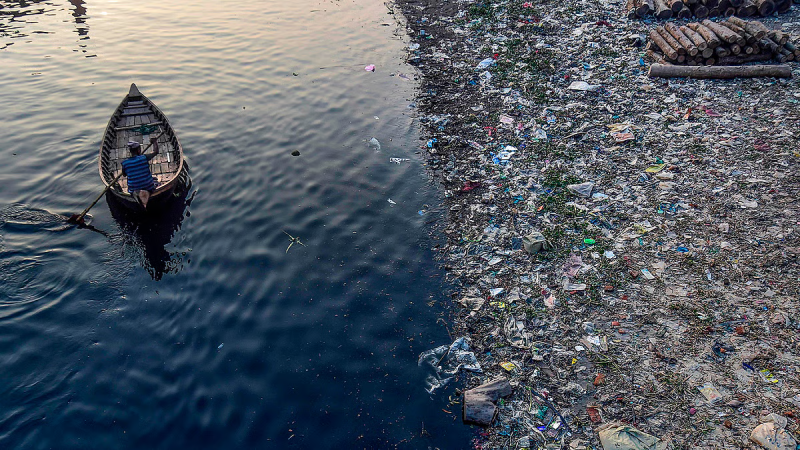- Muslim League leads new electoral alliance, Jatiya Muslim Jote |
- Tk 500cr Drive to Turn Haor Fallow Land Into Farmland |
- Tarique Rahman returns home amid rapturous reception |
- Home After 17 Years: Tarique Returns to Gulshan Residence |
- Tarique Calls for United Effort to Build a Safe Bangladesh |
Toxic Waste Chokes Dhaka’s Four Major Rivers

Toxic Waste Chokes Dhaka’s Four Major Rivers
Dhaka’s four surrounding rivers—the Buriganga, Turag, Balu, and Shitalakkhya—are being poisoned daily with 80,000 cubic metres of untreated liquid waste, leaving these lifelines critically endangered.
The revelation comes on World Rivers Day, observed on the last Sunday of September, under this year’s theme: “Our Rivers, Our Existence.”
According to the Bangladesh Inland Water Transport Authority (BIWTA), the Buriganga is among the world’s 10 most polluted rivers, contaminated with heavy metals such as chromium, iron, and zinc. At Sadarghat, dissolved oxygen levels are just 0.24 milligrams per litre—far below the 5 milligrams required to sustain aquatic life.
The Shitalakkhya, Turag, Balu, and Dhaleshwari rivers face similar threats, with industrial effluents stripping their waters of natural colour. Around 7,000 factories line these rivers, yet few operate functional treatment plants as legally required.
Daily, some 80,000 cubic metres of industrial waste flow into the rivers, with additional household sewage from 258 discharge points into the Buriganga, 269 into the Turag, 104 into the Balu, and 62 into the Tongi Canal. Dhaka also generates 45,000 tonnes of solid waste daily, 80 percent of which ends up in waterways. Mechanised vessels on the Buriganga add further pollution.
Residents allege funds meant for pollution control have been diverted to riverside beautification projects and parks, many of which now surround illegal structures.
Despite the High Court declaring rivers as ‘juristic persons’ in 2019 and naming the National River Conservation Commission (NRCC) as their guardian, enforcement remains weak. Surveys in 2018–2019 identified over 57,000 illegal river grabbers across 64 districts, yet only 32 percent were evicted. Encroachment has since resurged.
Experts stress urgent action. Dr Mujibur Rahman Howlader, former NRCC chairman, said, “No matter how much development we pursue, it will not be sustainable if rivers are not protected. Government and citizens alike must act, and younger generations must be educated about their importance.”
Environmental adviser Syeda Rizwana Hasan added, “Saving rivers requires joint effort and long-term planning. Only the Turag is currently undergoing a clean-up due to financial constraints.”
Economist Professor Anu Muhammad criticised the lack of progress, saying, “Pollution and encroachment persist despite hopes after the interim government formed post-uprising. A river reform commission and ratification of the UN 1996 water convention could have helped—but these remain pending.”

